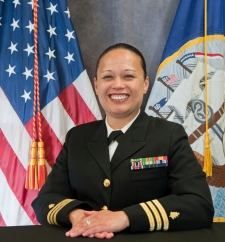Leading Care: Captain Karen Ann Belcar and the US Navy
In this interview, Captain Karen Ann Belcar, NC, USN, '96 BSN discusses her leadership in advancing nurses and health care through administrative roles.
She is an Adult Gerontology Clinical Nurse Specialist, Director for Healthcare Business, Navy Medicine Readiness Training and Command, Camp Pendleton, Calif.
How did you rise to this leadership position?
Every rank in the Navy Nurse Corps has a leadership role but as you put on higher rank, you gain more leadership responsibilities and have more of an impact on the command and the people you are leading. I strive for high sustained performance which reflects on our performance evaluation system that we use in the Navy. Navy Nurse Corps leadership promotes individuals who are performing above their peer group and I have been fortunate to have been promoted to a senior rank officer. Expectation is to hold a leadership position as a high ranking officer.
Who influenced you?
My family has greatly influenced my nursing career. They have always supported me and believed in me during the ups and downs of my nursing and naval career. I have many Navy Nurse Corps mentors and they continue to be my mentors even after they have retired. We have great camaraderie in the Nurse Corps. We have enduring relationships because we embrace diversity.
Why is it important to you? Why are you enthusiastic about your work in this role?
As a senior Nurse Corps officer, I have the opportunity to have a positive impact on the junior nurses and Navy corpsman. As a minority, female and an officer, I hope to have influence on what they believe they are capable of and what they can accomplish. Just being in the director position in the last few years, I have been able to mentor many nurses and provided mentorship on their naval career and professional development.
What are the issues you deal with and what’s the biggest challenge in your area?
One of my biggest challenges in Healthcare Business is staffing. The process of hiring for government civil service is very burdensome and the process is very long. I’ve had to wear multiple roles to cover for the gaps.
How are you effective in your role? What’s critical to your success in the role?
I believe in effective communication. I set my expectations early to my staff to ensure we all have the same goal as a directorate and ensure we all meet mission of the command. Having a clear vision as a directorate will ensure my staff understand how their individual efforts and strengths contribute to a higher level goals and aspirations.
How does innovation fit into your role as leader?
Being an innovative leader allows you to influence your team and the command’s growth for the future. The Military Health System is going through many process changes at this time. I have to depend and trust my staff to provide me new ideas and the opportunity to take on new responsibilities, learn new processes and develop new skills that will only make them better contributors in the long run.
Is there anything you wish you’d done differently on your rise to this position or while in it?
I’ve been fortunate that I’ve had mentors who has guided me on the right path in regards to professional development and my naval career. I wouldn’t change a thing.
What’s your advice to someone who wants to be a leader in their area of interest?
The expectation is very high once you become a senior Navy Nurse Corps officer. It’s challenging to be an effective leader. You have to be able to provide direction, inspiration, and guidance. You nurture the strengths and talents of the people you are leading and build a committed team to achieve the mission of the organization. Always lead by example. Demonstrate the behavior that you want people to follow. Have respect and integrity no matter what rank you are.
What is your leadership philosophy?
My leadership philosophy is transformational leadership. There is constant change in the Military Health System. A transformational leader must be able to motivate and inspire the people they are leading through goal-setting and overcoming challenges. You have to be a strong role model with high values to your junior nurses, corpsman and colleagues.
What’s your hope for our profession?
The nurse’s roles and responsibilities will change in the future to meet the increased demand for care that will be created by health care reform and the increasing complex health system. I hope nursing organizations will continue to be engaged with other health professionals and remain constant in leadership roles in redesigning care in the United States. I hope nursing schools continue the pipeline of producing bachelor’s prepared nurses. I hope to encourage nurses to pursue graduate degrees and especially doctoral degrees. But we have to be able to hire additional faculty otherwise who will teach the future generations of nurses.
What thoughts would you like to add about the effect of the pandemic on your work? Do you foresee changes in the future, including opportunities for nurses where they can have a positive impact?
Navy nursing is always ready to support any mission whether it be operational, humanitarian or Defense Support of Civil Authorities (DSCA) missions. Navy Medicine was tasked to support DSCA missions for the COVID response, whether it was providing patient care or supporting COVID vaccine shotex. We flex and adapt to any situation. That’s why I’m very proud of being part of the Navy Nurse Corps.
I believe there will be many opportunities for nurses in the future. I believe more and more nurses are likely specialize in the future which can lead to higher salary. They will have an impact on those specialties that are in high demand, such as Clinical Development Specialist, Nursing Informatics, Nurse Educator or Quality Control, to just name a few.

